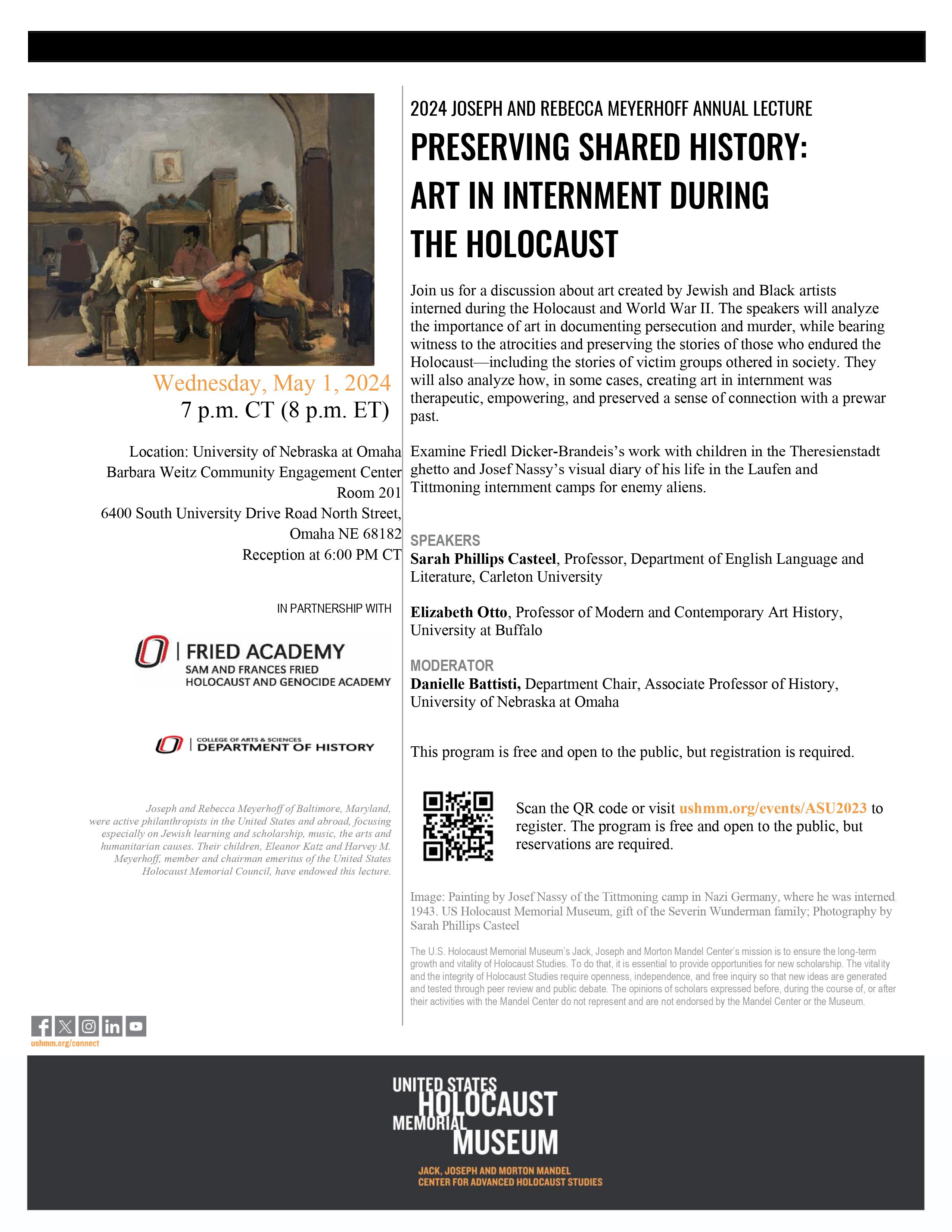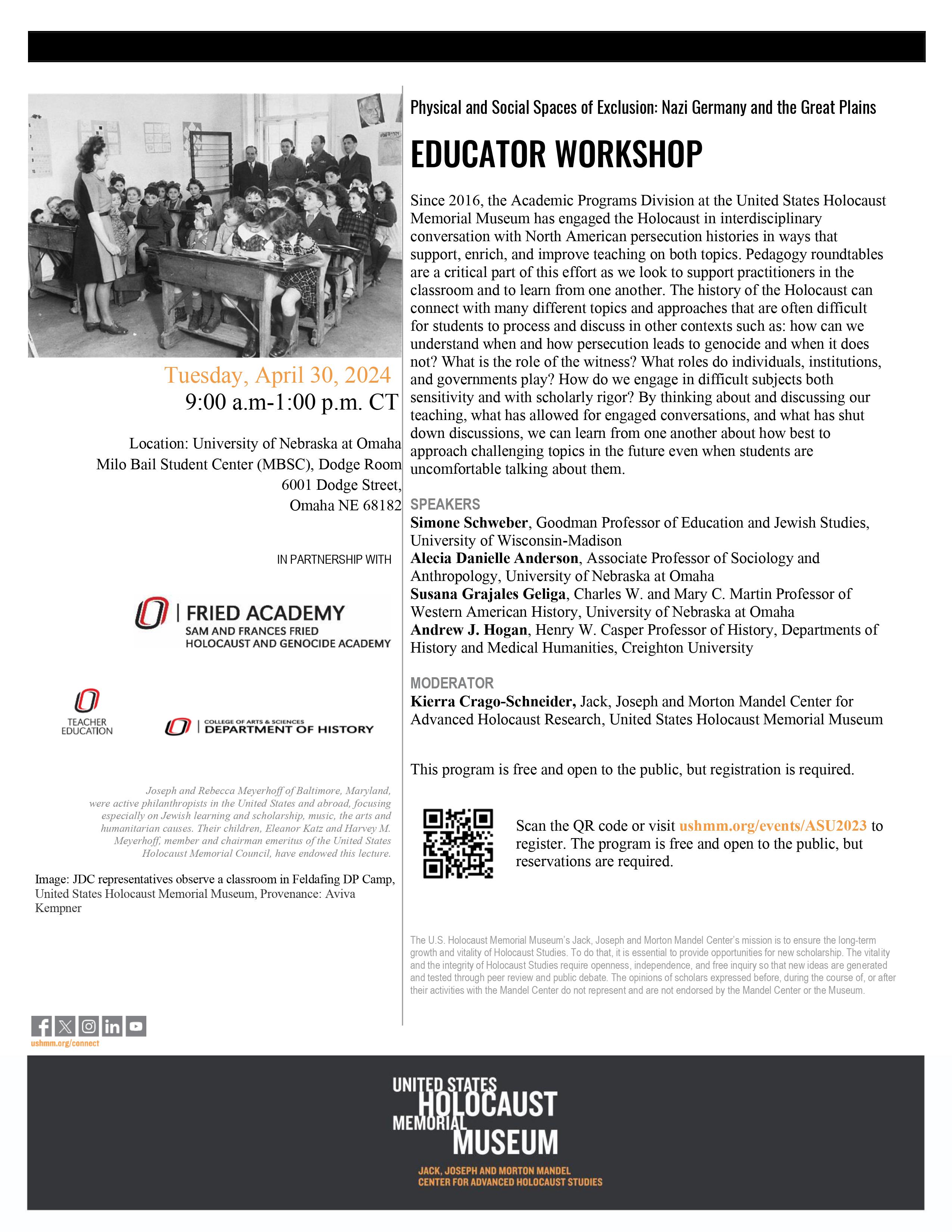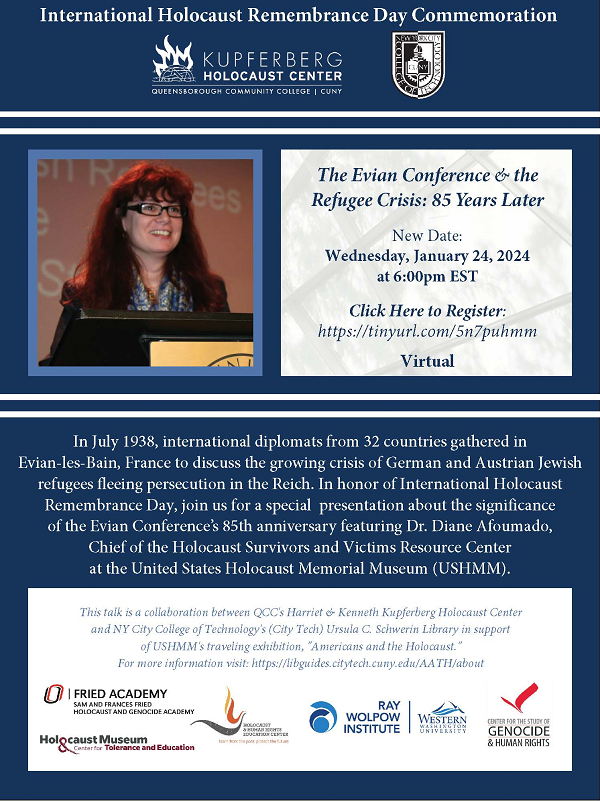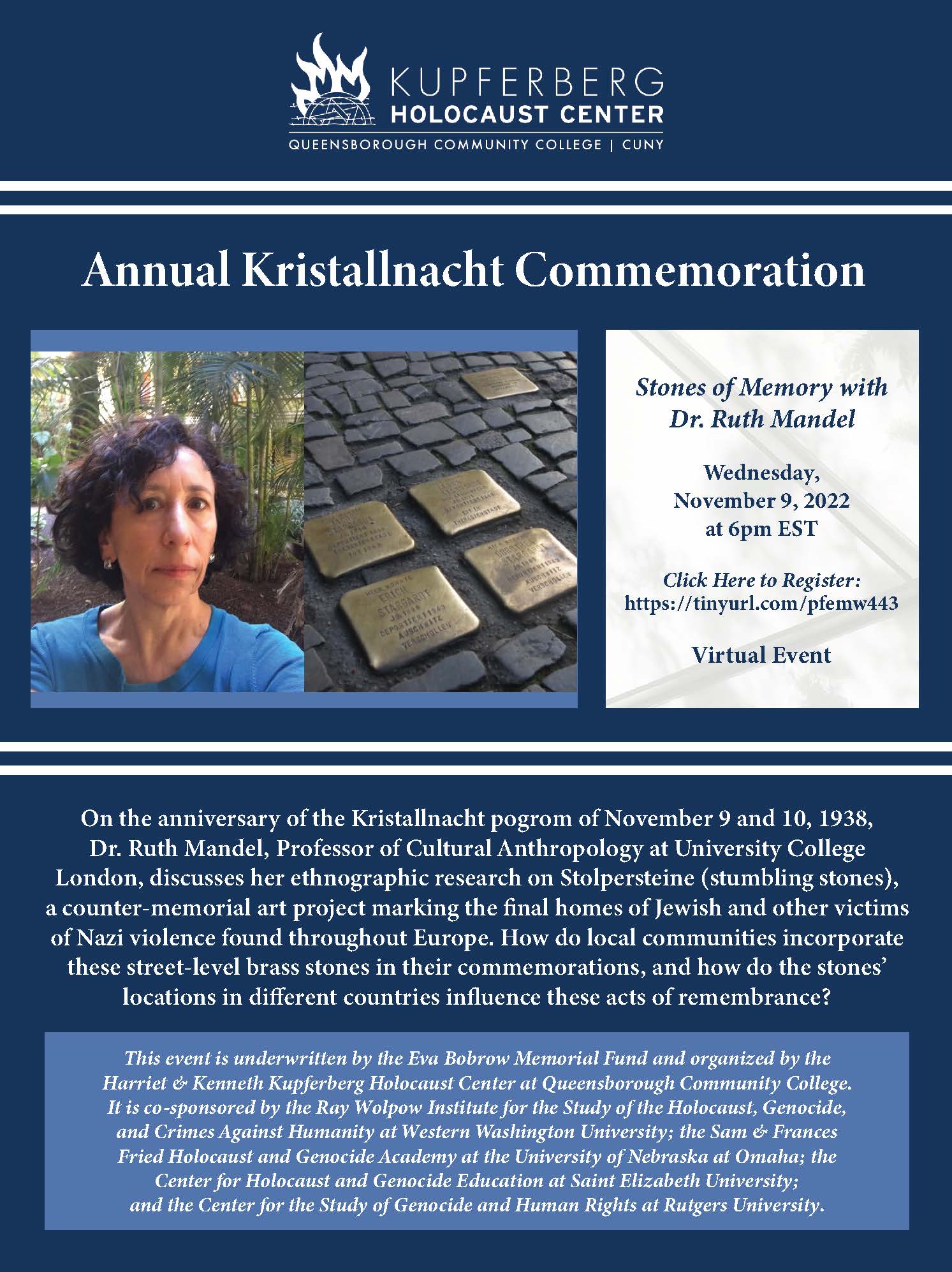Follow the Fried Academy on Facebook!
Events Archive
Click on a photo to see their promotional materials!
 |
Preserving Shared History: Art in Internment During the Holocaust The Nazi party introduced antisemitic exclusionary laws shortly after Adolf Hitler was appointed German Chancellor in January 1933. While Jews were the primary target of persecution and murder, those who did not fit the “Aryan” ideal espoused by the Nazis were also persecuted under exclusionary regulations, including gay men, Black people, and Sinti and Roma in Germany. This year’s Joseph and Rebecca Meyerhoff Annual Lecture will explore work produced by Jewish and Black artists interned during the Holocaust and World War II. Paying special attention to Friedl Dicker-Brandeis’s work with children in the Theresienstadt Ghetto and Josef Nassy’s visual diary of his life in the Laufen and Tittmoning internment camps for enemy aliens, the speakers will discuss the importance of art in documenting persecution and murder while bearing witness to the atrocities and preserving the stories of those who endured the Holocaust–including the stories of victim groups othered in society. They will also analyze how, in some cases, creating art in internment was therapeutic and empowering, acted as a form of “spiritual resistance,” and served as a means of preserving a sense of normalcy or connection with a prewar past. |
 |
Educator Workshop The history of the Holocaust can connect with many different topics and approaches that are often difficult for students to process and discuss in other contexts such as: how can we understand when and how persecution leads to genocide and when it does not? What is the role of the witness? What roles do individuals, institutions, and governments play? How do we engage in difficult subjects both sensitivity and with scholarly rigor? By thinking about and discussing our teaching, what has allowed for engaged conversations, and what has shut down discussions, we can learn from one another about how best to approach challenging topics in the future even when students are uncomfortable talking about them. |
 |
The Evian Conference & the Refugee Crisis: 85 Years Later In July 1938, international diplomats from 32 countried gathered in Evian-les-Bain, France to discuss the growing crisis of German and Austrian Jewish refugees fleeing persecution in the Reich. In honor of International Holocaust Remembrance Day, join us for a special presentation about the significance of the Evian Conference's 85th anniversary featuring Dr. Diane Afoumado, Chief of the Holocaust Survivors and Victims Resource Center at the United States Holocaust Memorial Museum (USHMM). |
 |
2023 Kristallnacht Commemoration: The State of Holocaust Education in the U.S. Today With antisemitism on the rise around the world, the demand for Holocaust education has become even more pressing. About half of the states in the United States have mandated Holocaust education while museums and academic programs alike continue to expand their outreach to include other genocides and human rights issues. Yet, questions remain. Are these strategies working? Are they enough? How should Holocaust education relate to other forms of discrimination? Should we adjust our expectations? On the anniversary of the Kristallnacht pogrom that took place November 9 and 10, 1938, join us for a conversation about the state of Holocaust education featuring Dr. Oren Stier, Professor of Religious Studies and Director of the Holocaust & Genocide Studies Program in the Steven J. Green School of International and Public Affairs at Florida International University. |
 |
"Ilse Koch on Trial" Dr. Tomaz Jardim will explore how gendered perceptions of violence and culpability drove Ilse Koch's zealous prosecution at a time when male Nazi perpetrators guilty of greater crimes often escaped punishment or received lighter sentences. Tomaz Jardim is Associate Professor of History at Toronto Metropolitan University, where he teaches on modern Europe, the world wars, and the Holocaust. Prior to his arrival at TMU, he taught at Concordia University in Montreal and held a fellowship at the United States Holocaust Memorial Museum in Washington, DC. His first book, The Mauthausen Trial: American Military Justice in Germany was published by Harvard University Press in 2012, and explores the role of U.S. military commission courts in punishing concentration camp perpetrators. |
 |
Wartime Cabaret: Remaking Theatre from a Jewish Ghetto In 2017, two teams of artists from Australia and South Africa reimagined a cabaret created in 1943 by Jewish prisoners in the wartime ghetto at Terezín (Theresienstadt) in Czechoslovakia. Using video from both performances, Dr. Lisa Peschel, Associate Professor in Theatre at the University of York, will show how the artists used the archival traces of the original script to bring Terezín’s past into our present while engaging with deeply felt contemporary concerns. This event is part of the 2022-23 Harriet & Kenneth Kupferberg Holocaust Center (KHC) and National Endowment for the Humanities (NEH) Colloquium, “Trauma, Remembrance and Compassion.” |
 |
Understanding White Supremacy: Decoding the Actions of the White Power Movement Dr. Kathleen Belew, Associate Professor of History and author of Bring the War Home: the White Power Movement and Paramilitary America, is a leading scholar in the United States on the history, ideology, and operations of the modern White Power Movement. Not only does Dr. Belew teach and research on these issues, but she is also a frequent commentor and contributor on the subject for major media outlets including The New York Times, The Washington Post, PBS Frontline, NPR, and other sources. |
 |
Visual Storytelling in Holocaust Education Join a webinar about the award-winning graphic book, "But I Live: Three Stories of Child Survivors of the Holocaust." Moderated by Charlotte Schallié, professor and chair in the Department of Germanic and Slavic Studies at the University of Victoria. Hosted by Mark Celinscak, Executive Director of the Sam and Frances Fried Holocaust and Genocide Academy. |
 |
Dramatic Engagement: The Arts and Holocaust Education Dr. Janet Rubin, Assistant Professor in the Departments of Visual and Performing Arts, Humanities, and Speech at Eastern Florida State College, demonstrates how the power of theater can be harnessed within the classroom to encourage a deeper understanding of the Holocaust while directly connecting students with survivors. Dr. Rubin also provides methodologies and resources on teaching about this tragic historical event through performance. This event is part of the 2022-23 Harriet & Kenneth Kupferberg Holocaust Center (KHC) and National Endowment for the Humanities (NEH) Colloquium, “Trauma, Remembrance and Compassion.” |
 |
Witnessing the Destruction of Culture by ISIS In collaboration with the UNO Art Gallery, the Fried Academy, and the exhibition Nobody's Listening, Secunda's lecture describes how his abstract painting practice changed direction 20-years ago and became an examination of the destruction of culture. His work has been exhibited internationally since the mid 90s, and was used as a tool of diplomacy between warring factions in Iraq in 2018. His work is in the collections of the Victoria and Albert Museum, London; The Iraq National Museum, Baghdad, and on permanent display at the Ashmolean Museum at Oxford University - the oldest Museum in the world. |
 |
Nobody's Listening A groundbreaking virtual reality experience and immersive exhibition that commemorates the genocide of the Yazidi people by the Islamic State in northern Iraq in 2014, premiered in the United States at UNO featuring art, artifacts, panels, installations, and virtual reality. |
 |
Kristallnacht Commemoration Keynote: Stones of Memory with Dr. Ruth Mandel On the anniversary of the Kristallnacht pogrom of November 9 and 10, 1938, Dr. Ruth Mandel, Professor of Cultural Anthropology at University College London, discusses her ethnographic research on Stolpersteine (stumbling stones), a counter-memorial art project marking the final homes of Jewish and other victims of Nazi violence found throughout Europe. How do local communities incorporate these street-level brass stones in their commemorations, and how do the stones' locations in different countries influence these acts of remembrance? |
 |
The Digitization of Genocide Memory: Consequences and Contestation Join us as Dr. David J. Simon, Director of the Genocide Studies Program at Yale University, discusses the memorialization of mass atrocities and genocide across a vast array of digital technologies, including both academic settings and unexpected virtual spaces like Minecraft, YouTube, and TikTok. What are the opportunities for remembrance that are made possible in these diverse spaces? What are the potential hazards of memorializing mass atrocities and genocide in them? |
 |
Reading Session with Sharmila Seyyid Sharmila Seyyid is a Sri Lankan writer and activist. She has published fiction, nonfiction, and poetry and her work has received awards including 'best novel of the year' for Ummath, available in English from HarperCollins. Two of her latest works will soon be published in English as well. |
 |
Trauma in Digital Spaces: The Future of Holocaust Remembrance What are the complexities of remembering the Holocaust through contemporary technologies? How can digital spaces facilitate compassionate responses to trauma and loss? Dr. Rachel Baum, Deputy Director of the Sam & Helen Stahl Center for Jewish Studies at the University of Wisconsin-Milwaukee, looks at the themes of the year - trauma, remembrance, and compassion - through contemporary technologies (including holograms of Holocaust survivors and virtual reality experiences of memorial sites). |
 |
Nobody's Listening: Virtual Reality Experience Preview Nobody's Listening is a virtual reality experience and immersive exhibition that commemorates the Yazidi genocide committed by ISIS in the summer of 2014 in Northern Iraq. |
 |
Entangled Memories of Violence: Rise and Heal Entangled Memories of Violence: Rise and Heal is an exhibition that pays credit to resilience and the courage to heal. The gallery has been created to showcase Sri Lankan writer and activist Sharmila Seyyid's literary work and activism. |
 |
Gendered Memories: The Legacy of Wartime Sexual Violence in Bosnia and Herzegovina |
 |
Narrating Srebrenica: Conducting Oral Histories with Genocide Survivors Featuring a conversation about the practical, ethical, and gendered challenges involved in conducting oral history interviews with and obtaining consent from genocide survivors. Featuring the authors of "Voices from Srebrenica: Survivor Narratives of the Bosnian Genocide" (McFarland & Company, 2021), Hasan Hasanović, Head of the Oral History Project at the Srebrenica Genocide Memorial and himself a genocide survivor and Ann Petrila, Professor of the Practice and Coordinator of Global Initiatives at the University of Denver’s Graduate School of Social Work, as well as Selma Leydesdorff, Professor of Oral History and Culture at the University of Amsterdam and author of "Surviving the Bosnian Genocide: The Women of Srebrenica Speak" (Indiana University Press, 2011). |
 |
Curious People, Big Ideas: Mark Celinscak with Special Guest Samuel Bak This conversation between Dr. Mark Celinscak and Samuel Bak explored how Bak's art can be used to explore challenging questions about human nature. And featured the UNO's Big Idea: The Samuel Bak Learning Center. Speakers and events for the 2020-2021 Curious People Series represent UNO's Big Ideas. These highlight areas of campus strength, especially where there are opportunities to enhance scholarly, research, and creative activities at UNO. |
 |
Holocaust by Bullets in the Occupied Soviet Territories: A 90-Minute Teacher Webinar Led by Yahad-In Unum, this teacher webinar aims to provide classroom teachers with a short overview of Holocaust by bullets as a mobile and public crime, a brief summary of YIU's investigative methodology, and several other educational tools that can be used in an online or in-person classroom setting. |
|
|
CAS Virtual Seminar Series: The Art of Samuel Bak This virtual discussion brought together key figures in the partnerships between Samuel Bak and his art with the College of Arts and Sciences. |
|
|
Anne Frank: A History for Today This traveling exhibit uniquely tells the story of Anne Frank against the background of the Holocaust and WWII. |
|
|
Music of Remembrance: 75 Years Later The program consisted of both familiar and less familiar classical works, new music honoring the life of Anne Frank, and music originating from the concentration camps. Guided tours were also available for a traveling exhibit about the life of Anne Frank |
|
Consortium of Higher Education Centers for Holocaust, Genocide, and Human Rights Studies The Fried Academy and the Goldstein Center for Human Rights hosted the second biennial meeting. |
|
 |
WITNESS: The Art of Samuel Bak Renowned artist and Holocaust survivor Samuel Bak visited UNO in September in tandem with a showing of 70 of his works. |
 |
Holocaust by Bullets The Fried Academy partnered with Yahad-In Unum (Together in One) to bring this program to UNO. Holocaust by Bullets traced the decades-long effort by Father Patrick Desbois to document the shooting deaths of more than 1.5 million Eastern European Jews after Nazi Germany's invasion of Russia during WWII. |
 |
Vectors of Violence The Fried Academy and the Morton Mandel Center for Advanced Holocaust Studies held an educational forum at UNO with the United States Holocaust Memorial Museum to discuss conditions that have led to the systematic oppression of minority groups in Nazi Germany and the Great Plains and how to prevent racism and hatred from occurring in the future. |
 |
Missouri Valley History Conference At the 60th Annual Missouri Valley History Conference, the Fried Academy and UNO Dept. of History brought Dr. Jake Newsome from the United States Holocaust Memorial Museum for two sessions: LGBTQ Studies and the Politics of Memory (Roundtable) Remembrances of Things Once Hidden: The Grassroots Efforts to Memorialize the Nazis' "Forgotten Victims" (Lecture) |
 |
Voices of Survival Three individuals of remarkable strength took the stage at UNO's Strauss Performing Arts Center. Each speaker shared their personal experience with persecution and dehumanization and their eventual journey to a safe haven in the United States. This event included a lobby exhibit featuring photographs from multiple exhibits. |











